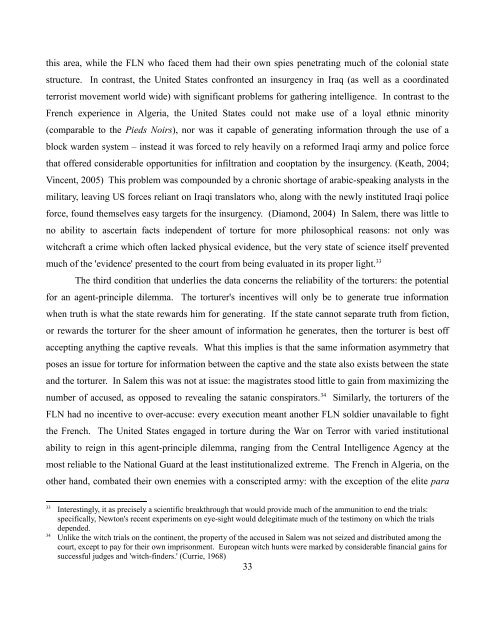The Torturer's Dilemma: Analyzing the Logic of Torture for Information
The Torturer's Dilemma: Analyzing the Logic of Torture for Information
The Torturer's Dilemma: Analyzing the Logic of Torture for Information
Create successful ePaper yourself
Turn your PDF publications into a flip-book with our unique Google optimized e-Paper software.
this area, while <strong>the</strong> FLN who faced <strong>the</strong>m had <strong>the</strong>ir own spies penetrating much <strong>of</strong> <strong>the</strong> colonial state<br />
structure. In contrast, <strong>the</strong> United States confronted an insurgency in Iraq (as well as a coordinated<br />
terrorist movement world wide) with significant problems <strong>for</strong> ga<strong>the</strong>ring intelligence. In contrast to <strong>the</strong><br />
French experience in Algeria, <strong>the</strong> United States could not make use <strong>of</strong> a loyal ethnic minority<br />
(comparable to <strong>the</strong> Pieds Noirs), nor was it capable <strong>of</strong> generating in<strong>for</strong>mation through <strong>the</strong> use <strong>of</strong> a<br />
block warden system – instead it was <strong>for</strong>ced to rely heavily on a re<strong>for</strong>med Iraqi army and police <strong>for</strong>ce<br />
that <strong>of</strong>fered considerable opportunities <strong>for</strong> infiltration and cooptation by <strong>the</strong> insurgency. (Keath, 2004;<br />
Vincent, 2005) This problem was compounded by a chronic shortage <strong>of</strong> arabic-speaking analysts in <strong>the</strong><br />
military, leaving US <strong>for</strong>ces reliant on Iraqi translators who, along with <strong>the</strong> newly instituted Iraqi police<br />
<strong>for</strong>ce, found <strong>the</strong>mselves easy targets <strong>for</strong> <strong>the</strong> insurgency. (Diamond, 2004) In Salem, <strong>the</strong>re was little to<br />
no ability to ascertain facts independent <strong>of</strong> torture <strong>for</strong> more philosophical reasons: not only was<br />
witchcraft a crime which <strong>of</strong>ten lacked physical evidence, but <strong>the</strong> very state <strong>of</strong> science itself prevented<br />
much <strong>of</strong> <strong>the</strong> 'evidence' presented to <strong>the</strong> court from being evaluated in its proper light. 33<br />
<strong>The</strong> third condition that underlies <strong>the</strong> data concerns <strong>the</strong> reliability <strong>of</strong> <strong>the</strong> torturers: <strong>the</strong> potential<br />
<strong>for</strong> an agent-principle dilemma. <strong>The</strong> torturer's incentives will only be to generate true in<strong>for</strong>mation<br />
when truth is what <strong>the</strong> state rewards him <strong>for</strong> generating. If <strong>the</strong> state cannot separate truth from fiction,<br />
or rewards <strong>the</strong> torturer <strong>for</strong> <strong>the</strong> sheer amount <strong>of</strong> in<strong>for</strong>mation he generates, <strong>the</strong>n <strong>the</strong> torturer is best <strong>of</strong>f<br />
accepting anything <strong>the</strong> captive reveals. What this implies is that <strong>the</strong> same in<strong>for</strong>mation asymmetry that<br />
poses an issue <strong>for</strong> torture <strong>for</strong> in<strong>for</strong>mation between <strong>the</strong> captive and <strong>the</strong> state also exists between <strong>the</strong> state<br />
and <strong>the</strong> torturer. In Salem this was not at issue: <strong>the</strong> magistrates stood little to gain from maximizing <strong>the</strong><br />
number <strong>of</strong> accused, as opposed to revealing <strong>the</strong> satanic conspirators. 34 Similarly, <strong>the</strong> torturers <strong>of</strong> <strong>the</strong><br />
FLN had no incentive to over-accuse: every execution meant ano<strong>the</strong>r FLN soldier unavailable to fight<br />
<strong>the</strong> French. <strong>The</strong> United States engaged in torture during <strong>the</strong> War on Terror with varied institutional<br />
ability to reign in this agent-principle dilemma, ranging from <strong>the</strong> Central Intelligence Agency at <strong>the</strong><br />
most reliable to <strong>the</strong> National Guard at <strong>the</strong> least institutionalized extreme. <strong>The</strong> French in Algeria, on <strong>the</strong><br />
o<strong>the</strong>r hand, combated <strong>the</strong>ir own enemies with a conscripted army: with <strong>the</strong> exception <strong>of</strong> <strong>the</strong> elite para<br />
33 Interestingly, it as precisely a scientific breakthrough that would provide much <strong>of</strong> <strong>the</strong> ammunition to end <strong>the</strong> trials:<br />
specifically, Newton's recent experiments on eye-sight would delegitimate much <strong>of</strong> <strong>the</strong> testimony on which <strong>the</strong> trials<br />
depended.<br />
34 Unlike <strong>the</strong> witch trials on <strong>the</strong> continent, <strong>the</strong> property <strong>of</strong> <strong>the</strong> accused in Salem was not seized and distributed among <strong>the</strong><br />
court, except to pay <strong>for</strong> <strong>the</strong>ir own imprisonment. European witch hunts were marked by considerable financial gains <strong>for</strong><br />
successful judges and 'witch-finders.' (Currie, 1968)<br />
33
















